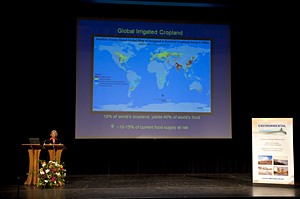
ADVERTISEMENT
- Rozovsky wins prestigious NSF Early Career Award
- UD students meet alumni, experience 'closing bell' at NYSE
- Newark Police seek assistance in identifying suspects in robbery
- Rivlin says bipartisan budget action, stronger budget rules key to reversing debt
- Stink bugs shouldn't pose problem until late summer
- Gao to honor Placido Domingo in Washington performance
- Adopt-A-Highway project keeps Lewes road clean
- WVUD's Radiothon fundraiser runs April 1-10
- W.D. Snodgrass Symposium to honor Pulitzer winner
- New guide helps cancer patients manage symptoms
- UD in the News, March 25, 2011
- For the Record, March 25, 2011
- Public opinion expert discusses world views of U.S. in Global Agenda series
- Congressional delegation, dean laud Center for Community Research and Service program
- Center for Political Communication sets symposium on politics, entertainment
- Students work to raise funds, awareness of domestic violence
- Equestrian team wins regional championship in Western riding
- Markell, Harker stress importance of agriculture to Delaware's economy
- Carol A. Ammon MBA Case Competition winners announced
- Prof presents blood-clotting studies at Gordon Research Conference
- Sexual Assault Awareness Month events, programs announced
- Stay connected with Sea Grant, CEOE e-newsletter
- A message to UD regarding the tragedy in Japan
- More News >>
- March 31-May 14: REP stages Neil Simon's 'The Good Doctor'
- April 2: Newark plans annual 'wine and dine'
- April 5: Expert perspective on U.S. health care
- April 5: Comedian Ace Guillen to visit Scrounge
- April 6, May 4: School of Nursing sponsors research lecture series
- April 6-May 4: Confucius Institute presents Chinese Film Series on Wednesdays
- April 6: IPCC's Pachauri to discuss sustainable development in DENIN Dialogue Series
- April 7: 'WVUDstock' radiothon concert announced
- April 8: English Language Institute presents 'Arts in Translation'
- April 9: Green and Healthy Living Expo planned at The Bob
- April 9: Center for Political Communication to host Onion editor
- April 10: Alumni Easter Egg-stravaganza planned
- April 11: CDS session to focus on visual assistive technologies
- April 12: T.J. Stiles to speak at UDLA annual dinner
- April 15, 16: Annual UD push lawnmower tune-up scheduled
- April 15, 16: Master Players series presents iMusic 4, China Magpie
- April 15, 16: Delaware Symphony, UD chorus to perform Mahler work
- April 18: Former NFL Coach Bill Cowher featured in UD Speaks
- April 21-24: Sesame Street Live brings Elmo and friends to The Bob
- April 30: Save the date for Ag Day 2011 at UD
- April 30: Symposium to consider 'Frontiers at the Chemistry-Biology Interface'
- April 30-May 1: Relay for Life set at Delaware Field House
- May 4: Delaware Membrane Protein Symposium announced
- May 5: Northwestern University's Leon Keer to deliver Kerr lecture
- May 7: Women's volleyball team to host second annual Spring Fling
- Through May 3: SPPA announces speakers for 10th annual lecture series
- Through May 4: Global Agenda sees U.S. through others' eyes; World Bank president to speak
- Through May 4: 'Research on Race, Ethnicity, Culture' topic of series
- Through May 9: Black American Studies announces lecture series
- Through May 11: 'Challenges in Jewish Culture' lecture series announced
- Through May 11: Area Studies research featured in speaker series
- Through June 5: 'Andy Warhol: Behind the Camera' on view in Old College Gallery
- Through July 15: 'Bodyscapes' on view at Mechanical Hall Gallery
- More What's Happening >>
- UD calendar >>
- Middle States evaluation team on campus April 5
- Phipps named HR Liaison of the Quarter
- Senior wins iPad for participating in assessment study
- April 19: Procurement Services schedules information sessions
- UD Bookstore announces spring break hours
- HealthyU Wellness Program encourages employees to 'Step into Spring'
- April 8-29: Faculty roundtable series considers student engagement
- GRE is changing; learn more at April 15 info session
- April 30: UD Evening with Blue Rocks set for employees
- Morris Library to be open 24/7 during final exams
- More Campus FYI >>
11:25 a.m., May 13, 2010----Water is life, and it has no substitute in most of its uses.
Water is renewable, thanks to the hydrologic cycle, but it's also finite.
According to Sandra Postel, director of the Global Water Policy Project and Freshwater Fellow at the National Geographic Society, these qualities make water fundamentally different from other commodities.
Postel was the first speaker hosted by the Delaware Environmental Institute (DENIN) in the new DENIN Dialogue Series. She spoke in the University of Delaware's Mitchell Hall on Monday, May 10.
Postel's basic message was that we live in an increasingly water-stressed world as the result of a rapidly increasing global population and decades of practices that threaten the continued adequacy of this finite commodity.
Many of society's needs for water have been met through damming. Since 1950, the number of large dams in the world has grown from 5,000 to 50,000. “That's an average of two per day over half a century,” Postel said, “and these dams have brought about major changes in our hydrologic environment.”
Water is dammed for a variety of purposes, including hydropower, irrigation, flood control, and recreation. “These are all good reasons economically, but we haven't thought much about what this approach does ecologically,” Postel said.
Water in its natural state performs many of the same functions, but we put little value on the services provided through nature's work. Many rivers no longer reach the sea for extended periods of time, and wetlands are disappearing. In California, for example, 90 percent of pre-development wetlands are gone.
But Postel's most chilling cautionary tale came from central Asia, where the Aral Sea, once the fourth-largest inland lake in the world, has shrunk to a small fraction of its original size because the rivers that replenished it were diverted to irrigate cotton crops. The fisheries in the area are gone, and many people have left the area. Those that remain are generally in poor health, suffering from respiratory problems, anemia, and other illnesses.
“What happened to the Aral Sea really shows the connection between the health of a people and the health of the ecosystem they depend on,” Postel said. “This isn't a parable but a real story about the end of doing things according to the mindset of 'water has value only when we take it out of the natural world.'”
Changing the flow of rivers also impacts biodiversity. Postel cited the Missouri River as an example. The river's natural peaks and valleys have flattened significantly, removing the natural cues that prompt certain species to spawn or migrate.
Climate change has recently added a new stress, altering the hydrologic cycle through floods and droughts, glacial melting, river runoff patterns, and fire.
Given these realities, Postel believes that the problem needs to be addressed through a water management approach that integrates the protection of ecosystem health and ecosystem services. “This will maximize the total value of water,” she said, “and unleash the potential of conservation and efficiency to help meet human needs for water without taking any more out of the environment.”
She cited some instances where policies founded on this philosophy are being implemented. In South Africa, for example, water is treated as a public trust, with the highest priority for its use being to meet basic drinking water needs and the basic needs of ecosystems. “This policy reflects a community-based appreciation for what water is doing for society,” Postel said.
Other practices that would contribute to better water management for ecosystem health include raising irrigation efficiency, improving rain-fed farming, shifting crop patterns, and expanding urban farming.
In some cases, companies are taking a harder look at water consumption in product supply chains. Unilever, for example, has reduced factory water use by 63 percent since 1995, with many of its factories currently at zero discharge.
“The average American's water footprint is 1,800 gallons a day,” Postel said. “Less than 10 percent of that comes out of the faucet. Water is embedded in everything we do. It takes 634 gallons of water to produce a hamburger and 2,900 to make a pair of jeans.”
Postel left the audience with her recommendation for a water ethic: Provide all living things with enough water before some get more than enough.
“This is a very simple guiding principle,” she said, “but we haven't been operating that way.”
Article by Diane Kukich
Photos by Evan Krape



